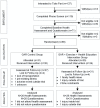Walk, Talk and Listen: a pilot randomised controlled trial targeting functional fitness and loneliness in older adults with hearing loss
- PMID: 30987987
- PMCID: PMC6500300
- DOI: 10.1136/bmjopen-2018-026169
Walk, Talk and Listen: a pilot randomised controlled trial targeting functional fitness and loneliness in older adults with hearing loss
Abstract
Background: Age-related hearing loss (HL) is a prevalent disability associated with loneliness, isolation, declines in cognitive and physical function and premature mortality. Group audiological rehabilitation (GAR) and hearing technologies address communication and cognitive decline. However, the relationship between loneliness, physical function and GAR among older adults with HL has not been studied.
Objectives: Explore the impact of a group exercise and socialisation/health education intervention and GAR on physical function and loneliness among older adults with HL.
Trial design: A Young Men's Christian Association (YMCA)-based, 10-week, single-blind, pilot randomised controlled trial (RCT).
Participants: Ambulatory adults aged 65 years or older with self-reported HL.
Interventions: Seventy-one participants were screened. Thirty-five were randomised to intervention (strength and resistance exercise, socialisation/health education) and GAR (hearing education, communication strategies, psychosocial support) or control (n=31): GAR only.
Outcomes: Ninety-five per cent of eligible participants were randomised. GAR and exercise adherence rates were 80% and 85%, respectively. 88% of participants completed the study. Intervention group functional fitness improved significantly (gait speed: effect size: 0.57, 30 s Sit to Stand Test: effect size: 0.53). Significant improvements in emotional and social loneliness (effect size: 1.16) and hearing-related quality of life (effect size: 0.76) were related to GAR attendance and poorer baseline hearing-related quality of life. Forty-two per cent of participants increased social contacts outside the study.
Discussion: Walk, Talk and Listen was feasible and acceptable. Exercise and socialisation/health education improved loneliness and key fitness measures but provided no additional benefit to GAR only for loneliness. This is the first preliminary evidence about the benefits of exercise on fitness and GAR on loneliness among older adults with HL.
Implications: This pilot trial provides key information on the sample size required for a larger, longer term RCT to determine the enduring effects of this holistic intervention addressing the negative psychosocial and musculoskeletal downstream effects of HL among older adults.
Keywords: auditory rehabilitation; exercise; hearing loss; loneliness.
© Author(s) (or their employer(s)) 2019. Re-use permitted under CC BY-NC. No commercial re-use. See rights and permissions. Published by BMJ.
Conflict of interest statement
Competing interests: None declared.
Figures
References
-
- Statistics Canada. Hearing Loss of Canadians, 2012 to 2015. Ottawa: 2016.
-
- Strawbridge WJ, Wallhagen MI, Shema SJ, et al. . Negative consequences of hearing impairment in old age: a longitudinal analysis. Gerontologist 2000;40:320–6. - PubMed
Publication types
MeSH terms
LinkOut - more resources
Full Text Sources
Medical

